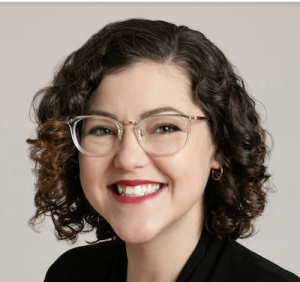Amanda Fritz is an MPNL graduate and the Director of Major Gifts at the Montreal-based Fondation CHU Ste-Justine. PANL Perspectives spoke to Fritz about fundraising’s dynamic nature and the importance of making career changes within the philanthropic sector. The interview, edited for length and clarity, is by Sherlyn Assam.
 In addition to being a director, you’re a Certified Fundraising Executive. What traits or tactics make an effective fundraising team?
In addition to being a director, you’re a Certified Fundraising Executive. What traits or tactics make an effective fundraising team?
 Fritz: The use of volunteers. It’s something my mentors taught me. People give to people, and oftentimes, the best person to make an ask is a peer, not just someone representing the cause. It’s definitely more common to use volunteers in a campaign context.
Fritz: The use of volunteers. It’s something my mentors taught me. People give to people, and oftentimes, the best person to make an ask is a peer, not just someone representing the cause. It’s definitely more common to use volunteers in a campaign context.
Also, every nonprofit has a board, but those volunteer boards are not always used in a fundraising capacity. You need to train your board members, who are arguably the closest to your organization in terms of volunteering. You need to be equipping them with how to tell their story, how to be compelling, how to speak about your organization.
 You worked at McGill University for 13 years. When did you begin thinking of moving beyond that?
You worked at McGill University for 13 years. When did you begin thinking of moving beyond that?
Fritz: One of the things with staying at McGill as long as I did was that I had a lot of different jobs. I had six different titles. One thing about career change or role change is that you should try to look within your own organization for new roles if you can. Sometimes people’s first instinct is to work somewhere else, but maybe you can work within the same place in a different role.
It’s important to get exposure to different types of fundraising and find a type that matches your interests. There are fundraising roles for introverts and for extroverts. I think if more people knew that, more people might think about careers in professional fundraising.
 Do you think there was enough exposure to different parts of fundraising in the MPNL program? What are your biggest takeaways from the fundraising courses?
Do you think there was enough exposure to different parts of fundraising in the MPNL program? What are your biggest takeaways from the fundraising courses?
 Fritz: If you want to work with nonprofits, you need to understand how fundraising is crucial to them. I’d say the intro course (PANL 5301) is a must for everyone. If you have a background in fundraising, you absolutely need to take the advanced course (PANL 5306), because it goes beyond basics. It gets into advanced topics, such as power in philanthropy, as well as trust-based philanthropy and community-centric giving models – topics that break down long-standing power dynamics. We need our incoming professionals to have these concepts in their heads before they enter the field.
Fritz: If you want to work with nonprofits, you need to understand how fundraising is crucial to them. I’d say the intro course (PANL 5301) is a must for everyone. If you have a background in fundraising, you absolutely need to take the advanced course (PANL 5306), because it goes beyond basics. It gets into advanced topics, such as power in philanthropy, as well as trust-based philanthropy and community-centric giving models – topics that break down long-standing power dynamics. We need our incoming professionals to have these concepts in their heads before they enter the field.
 Can you speak more about the principle of trust that incoming professionals need?
Can you speak more about the principle of trust that incoming professionals need?
Fritz: You need to be transparent with your donors. Some donors will fund just new projects, but many nonprofits are working on shoestring budgets and need other kinds of funds. This over-emphasis by many donors on new projects means that you get funding for a new program but don’t have money to pay for your location or your water bill. Mission fundraising is important; rebalancing philanthropy to recognize mission fundraising is important.
 How did the pandemic affect fundraising, and how do you think it’s going to affect the sector long-term?
How did the pandemic affect fundraising, and how do you think it’s going to affect the sector long-term?
Fritz: The pandemic forced a number of organizations to update their online giving platforms, and many have transitioned away from events. Many organizations used to rely on five or six labor-intensive fundraising events during a year. They’ve now put those efforts and resources into online giving, major-gifts programs and other forms of philanthropy, particularly at smaller organizations. That’s an important transition, because events are good at raising awareness and money, but they take a lot of effort – effort that could be better spent focusing on major gifts, on volunteers and on better forms of philanthropy.
Amanda Fritz is on LinkedIn. Sherlyn Assam is on LinkedIn and Twitter.
Wednesday, September 29, 2021 in Online Fundraising, Q&A
Share: Twitter, Facebook



